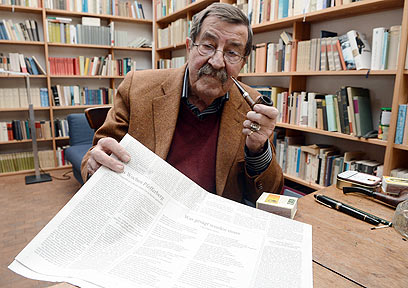
Grass: Poem meant to target Netanyahu
German Nobel literature laureate claims controversial poem aimed against Israel's government, not entire country. Iranian official: 'Poem's revelation of truth may awaken silent conscience of West'
German Nobel literature laureate Guenter Grass, under fire for a poem that sharply criticized Israel, said he was singling out the Jewish state's government, not the country as a whole.
In the poem published in European dailies earlier this week, Grass criticized what he described as Western hypocrisy over Israel's nuclear program and labeled the country a threat to "already fragile world peace" over its stance on Iran.
Related stories:
- Grass lashes out at 'campaign' over Israel-Iran poem Germany's Grass says Israel endangers world peace Netanyahu: Guenter Grass poem 'shameful'
Iranian Deputy Culture Minister Javad Shamaqdari said in a letter that the 84-year-old poet's revelation of "truth may awaken the silent conscience" of the West. A copy of the letter was posted Saturday on the semiofficial Fars news agency.
"Why do I say only now ... that the nuclear power Israel endangers an already fragile world peace? Because that must be said which may already be too late to say tomorrow," Grass wrote in the poem, published in German in Sueddeutsche Zeitung.

Targeted Netanyahu. Grass (Photo: MCT)
In an interview published Saturday by the daily Sueddeutsche Zeitung, Grass said he sought foremost to single out Prime Minister Benjamin Netanyahu's government, whose policies "are creating ever more enemies of Israel, and are ever more increasing the country's isolation."
"The man who damages Israel the most at the moment is in my opinion Netanyahu – and I should have included that in the poem," Grass was quoted as saying.
"What is now an imminent threat is a risk without parallel – a preventive strike, a first strike against Iran which would have terrible consequences," Grass told Sueddeutsche Zeitung.
'The eternal anti-Semite'
The poem drew sharp rebukes at home and from Israel, including accusations of being anti-Semitic, but Grass received praise from a senior Iranian official Saturday.
Grass, who admitted in 2006 that he once served in Hitler's Waffen SS, drew criticism at home and around the world, tThe German Welt newspaper calling him "the eternal anti-Semite" in a front page article commenting on the poem, which was widely circulated in advance of its publication.
"Grass is the prototype of the educated anti-Semite who means well with the Jews. He is hounded by guilt and feelings of shame and at the same time is driven by the wish to weigh up history," the newspaper wrote on Wednesday.
On Thursday, Prime Minister Benjamin Netanyahu also slammed Grass, saying: "The shameful comparison he made between Israel and Iran says very little about Israel but speaks volumes about Mr. Grass."
"It's Iran, not Israel, that endorses the Syrian massacre. It's Iran, not Israel that pelts women with stones, hangs homosexuals and brutally suppresses tens of millions of its citizens," Netanyahu said.
Netanyahu also addressed Grass' past, saying: "For six decades Mr. Grass concealed his past, and it therefore comes as no surprise that he regards the only Jewish state in the world as a threat to world peace and opposes its procurement of means of self defense.
"However, honest people around the world must harshly condemn these shameful and ignorant statements," he noted.
Associated Press and Reuters contributed to this report
- Receive Ynetnews updates directly to your desktop










